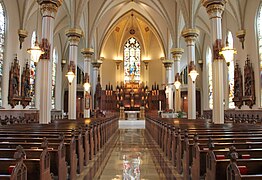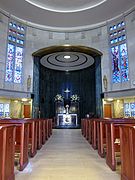Cathedral of the Immaculate Conception (Fort Wayne, Indiana)
This article needs additional citations for verification. (July 2011) |
Cathedral of the Immaculate Conception | |
 West façade in November 2012 | |
| Location | 915 South Clinton Street, Fort Wayne, IN 46802, (corner of Jefferson and Calhoun Streets) Fort Wayne, Indiana |
|---|---|
| Coordinates | 41°4′32.51″N 85°8′16.19″W / 41.0756972°N 85.1378306°W |
| Area | less than one acre |
| Built | 1859-1860 |
| Architect | Benoit, Rev. Msgr Julian |
| Architectural style | Gothic |
| NRHP reference No. | 80000048[1] |
| Added to NRHP | October 23, 1980 |
The Cathedral of the Immaculate Conception in Fort Wayne, Indiana, is the primary cathedral of the Roman Catholic Diocese of Fort Wayne-South Bend, headed by Most Rev. Kevin C. Rhoades. The parish was established in 1836, making it the oldest in Fort Wayne. The church was erected in 1860.
History
[edit]In 1836, Father Louis Mueller was appointed the first resident pastor of the Fort Wayne Territory in the Vincennes Diocese. Mueller began construction on a small log church.[2]
Father Julian Benoit became pastor in 1840. He paid off the debt and purchased the remaining portion of the square, initially for use as a cemetery. In 1849, the German portion of St. Augustine's parish built St. Mary Church (not the present-day St. Mary Church in Fort Wayne), the first German-speaking congregation in Fort Wayne.[3]
The parish rectory was built in 1854. In 1857, the Diocese of Fort Wayne was erected. Bishop John Luers designated St. Augustine's as his cathedral, while at the same time making plans for a larger, more permanent church. St. Augustine's was destroyed by fire in 1859.[2]
The cornerstone for the new cathedral was laid on Trinity Sunday 1859. Rev. Benoit who designed it, named it the Cathedral of the Immaculate Conception, in honor of the Blessed Virgin.[4]: 3
Benoit was the primary fundraiser, making trips to New Orleans and France. Much of the costs he covered himself. The cathedral was dedicated on the feast of the Immaculate Conception, December 8, 1860.[2]
In 1901, the Bishop's house and chancery was erected; paid for by the sale of a farm in Jasper County.[3]
Architecture
[edit]The large sanctuary window of Mary was made in Benoit's home country of France and installed in the summer of 1861. The brass candlesticks with the figures of the Apostles were also from France. The crucifix and altar stone were salvaged from St. Augustine Church.
In 1896, the Cathedral underwent a thorough renovation, supervised by Msgr. Joseph H. Brammer.[3] Twelve stained-glass windows from the Royal Bavarian Art Institute, in Munich depict scenes from the Life of Mary.[5] The wood-carved Stations of the Cross are also from Germany.
-
View up the nave toward the chancel.
-
View down the nave toward gallery.
-
MacDougal Memorial Chapel
-
Chapel interior
Burials
[edit]- Msgr. Julian Benoit (†January 26, 1885)
- Bishop John Henry Luers (†June 29, 1871)
- Bishop Joseph Dwenger (†January 22, 1893)[6]
- Bishop Herman Joseph Alerding (†December 6, 1924)[7]
Present day
[edit]The Cathedral building still stands today, maintained through various renovations over the decades, the most recent by Schenkel and Sons, Inc.
The Cathedral grounds, called the Cathedral Square, includes the Chancery of the Diocese of Fort Wayne-South Bend, MacDougal Chapel, Cathedral Center for C.C.D. classes (formerly the Cathedral Boys School), and the Rectory (the priests' residence), and the grave of the last Miami Indians chief, Joseph Richardville.[4]: 3 Recently, the Cathedral Museum housed in the basement of MacDougal Chapel and diocesan offices located in the Cathedral Center were moved to a new location a few blocks north of Cathedral Square.
It was listed on the National Register of Historic Places in 1980.[1]
Current pastoral staff
[edit]- Rector - Fr. Jacob D. Runyon
- Associate pastors - Fr. Peter Dee De and Fr. Wimal Jayasuria
See also
[edit]- List of Catholic cathedrals in the United States
- Roman Catholic Marian churches
- List of tallest buildings in Fort Wayne
References
[edit]- ^ a b "National Register Information System". National Register of Historic Places. National Park Service. July 9, 2010.
- ^ a b c LaBarbera, Vince. "Cathedral of the Immaculate Conception marks 150th anniversary of dedication", Today's Catholic, Roman Catholic Diocese of Fort Wayne-South Bend, December 1, 2010
- ^ a b c Alerding, Herman Joseph. The Diocese of Fort Wayne, 1857-September 1907, Fort Wayne, Indiana., Archer Print Company, 1907, p. 202
- ^ a b "Indiana State Historic Architectural and Archaeological Research Database (SHAARD)" (Searchable database). Department of Natural Resources, Division of Historic Preservation and Archaeology. Retrieved 2015-07-01. Note: This includes Ann Bley (September 1978). "National Register of Historic Places Inventory Nomination Form: Cathedral of the Immaculate Conception" (PDF). Retrieved 2015-07-01. and Accompanying photographs
- ^ Doyle, Carmen. "A Brief History of the Cathedral of the Immaculate Conception", The History Center, Allen County-Fort Wayne Historical Society
- ^ "Burial of Bishops Brooks and Dwenger". St. Louis Globe-Democrat. 1893-01-27. p. 4. Retrieved 2022-11-18 – via Newspapers.com.

- ^ "Indiana Bishop is Dead; Burial at Fort Wayne". The Muncie Sunday Star. 1924-12-07. p. 1. Retrieved 2022-11-18 – via Newspapers.com.

External links
[edit] Media related to Cathedral of the Immaculate Conception (Fort Wayne, Indiana) at Wikimedia Commons
Media related to Cathedral of the Immaculate Conception (Fort Wayne, Indiana) at Wikimedia Commons- Official website
- Roman Catholic Diocese of Fort Wayne-South Bend Official Site
- LaBarbera, Today's Catholic, December 1, 2010 -extensive list of renovations
- video re stained glass windows
- numerous photographs of buildings around Cathedral Square, p. 21 et seq
- Roman Catholic cathedrals in Indiana
- Religious organizations established in 1836
- National Register of Historic Places in Fort Wayne, Indiana
- Churches on the National Register of Historic Places in Indiana
- Culture of Fort Wayne, Indiana
- Roman Catholic churches in Fort Wayne, Indiana
- Roman Catholic churches completed in 1859
- 19th-century Roman Catholic church buildings in the United States
- Gothic Revival church buildings in Indiana
- 1836 establishments in Indiana









